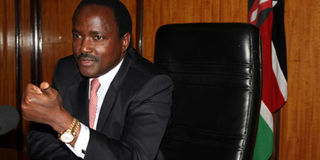Kalonzo defends shuttle over ICC trials

Vice President Kalonzo Musyoka. His shuttle diplomacy to convince African governments to postpone trials of six Kenyans at the International Criminal Court at the Hague elicited heated debate in the House February 8, 2011. FILE
Vice President Kalonzo Musyoka’s shuttle diplomacy to convince African governments to postpone trials of six Kenyans at the International Criminal Court at the Hague elicited heated debate in the House Tuesday.
MPs sought to know whether the mission was worthwhile and value for money.
Mr Musyoka, who is also the Leader of Government Business in Parliament, told the House that the mission cost the government Sh31.5 million. The money was drawn from his Home Affairs Ministry.
Expenses for members of the delegations from other ministries such as officials from Foreign Affairs who accompanied the VP and Minister’s Njeru Githae, Najib Balala (Tourism) and Chirau Mwakwere (Trade) were met by their respective ministries, the Vice President said.
“He said: “It is not a waste of funds, we have been moderate on the expenditure. We even cut down on the number of people in the delegations,’’ he explained.
Ikolomani MP Dr Boni Khalwale had maintained that the VPs mission was futile and a waste of public funds.
Last week, Foreign Affairs assistant minister Richard Onyonka told Parliament that his officials who accompanied the VP on the lobby mission spent Sh3.7million for the trip.
Mr Musyoka gave a lengthy statement to the House following a question by Dr Khalwalwe, who wanted it clarified whether the VPs mission to lobby African States to support Kenya’s bid to pull out of ICC reflects the official government position. He also wanted to know how much was pent and whether the tax payer got value for money.
Mr Musyoka maintained his position that the mission had been sanctioned by the Cabinet insisting that members of government who spoke later claimed it was not a Cabinet decision had jumped ship on realising it was a hot issue while others did so to gain political mileage.
He made the remarks after Dr Khalwale and Mr John Mbadi (Gwasi ODM) reminded the House that Prime Minister Raila Odinga and Justice Minister Mutula Kilonzo had disowned the decision and declared that his shuttle diplomacy had not been endorsed by the Cabinet.
“It was a collective decision and others would want to jump out of it when it gets hot while others would do so to get political mileage,’’ said the VP.
But the VP vehemently defended the now controversial move, insisting that it was well received by the government’s lobbied, with South African President Jacob Nzuma whose country is a member of the UN Security Council pledging to support Kenya's bid.
“I can confirm it in President Nzuma’s words…Kenya, please keep us informed and we will do Kenya’s bidding,’’ he told the House.
The Vice President was also hard put to explain why he was accompanied in his trip by his party MPs Prof Phillip Kaloki and Ahmed Affey. He responded that he took the two along to prove to them that the mission was worthwhile, “because they had been doubting".
Mr Musyoka announced that his next mission would be to lobby the five permanent members of the UN Security Council- United Kingdom, Russia, China, France and the United States.
Ms Martha Karua (Gichugu, Narc Kenya) demanded to know whether the Government had consulted victims of the post elections violence before proceeding on the mission which she said was meant to protect the six suspects in the Ocampo list.
She also put him to task to tell Parliament whether the government had now taken a collective decision for a local judicial mechanism yet the leadership could not even agree on nomination of the country’s Chief Justice. Ms Karua said it was important that the government balances the larger interests of all Kenyans.
In response, Mr Musyoka remaked that “the government had took the interest and welfare of the IDPs into account".
Mr Gitobu Imanyara (Imenti Central, CCU) questioned why the government had opted to lobby foreign support while seeking a deferral directly from the ICC as provided for in the Rome Statute was the cheaper and easier route.




